I Love You Dog Funny Images
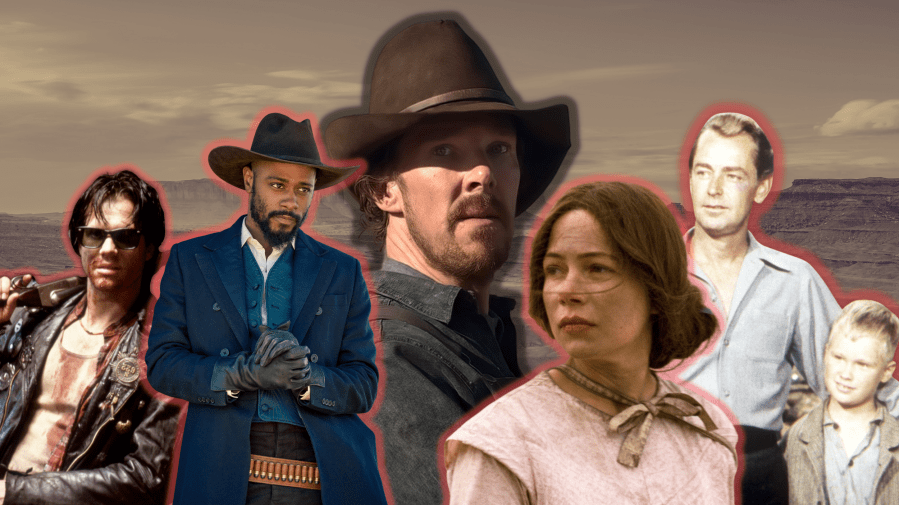
In the days leading up to the Oscars, Jane Campion's film Power of the Dog got me thinking about Westerns. For a moment, I was having what I thought were some really insightful thoughts about how rare it is for a Western to win Best Picture. Then I remembered that Nomadland, the film that won Best Picture just last year, was described as a Western by many.
Westerns, in a way, are pure Hollywood. The classics of the genre are concerned with wide-open spaces and the frontier, with possibility and individuality — in so many ways, Hollywood itself, at the western limit of the continent, where the desert finally meets the sea, is the culmination of all these concerns. Almost immediately though, filmmakers started making revisionist Westerns — stories that reacted against the commonplace tropes of the genre. Films like Nomadland, with its desert scenery and commentary on loneliness, and Power of the Dog, with its examination of the rot underneath masculinity, use the themes of the traditional Western to say something important about where we are now.
I've loved the Western for as long as I can remember — even some of the early ones that don't seem to be examining much of anything. I'm easily won over by the magic of the movies writ large; I'm taken in by big scenery, dramatic moods, gunfights, you name it. Still, I'm also a person who wants to think about what it all means, what I might be ignoring, and what I might have missed, so the Westerns I really love are the revisionist ones. Here are some great ones that ask the big questions while remaining incredibly exciting, moving, and even fun to watch.
The Ox-Bow Incident (1943)
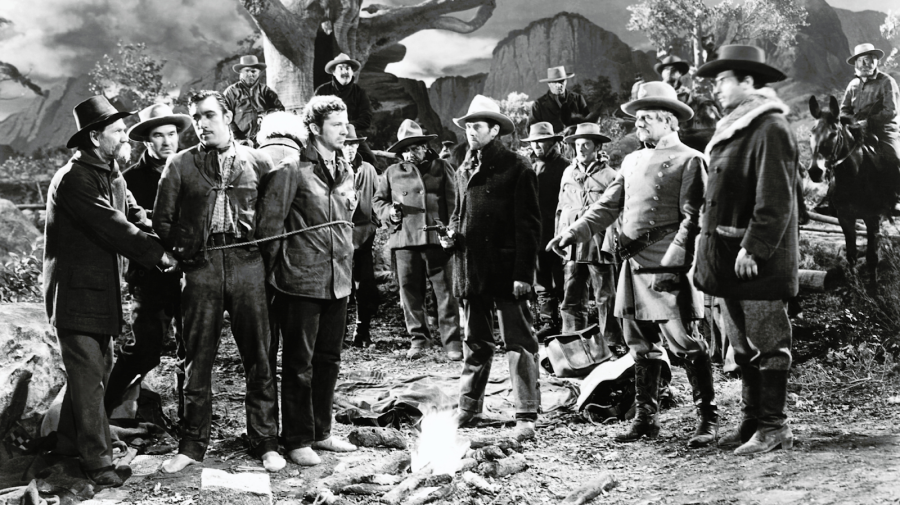
The Ox-Bow Incident combines the setting of a Western with the drama of a courtroom, and with a running time of just 75 minutes, it's the shortest film on this list. The film centers around a crime: a small-town cattle rancher has been killed, and the townspeople are already on edge because there have been recent instances of cattle-rustling. The town forms a posse, and the posse heads out and quickly finds three men in possession of the dead man's cattle. The movie itself follows the dilemma of how to serve the demands of justice.
I won't ruin the whole plot for you, but this is a movie about the difficulty of standing up to the mob, and the danger of jumping to conclusions. The standard Western movie idea — that there is a clear delineation between right and wrong — is turned around here; watching the movie, you can't help but feel implicated and immersed in the drama. Henry Fonda's moving performance as a man overwhelmed by the mob will likely stick with you for a long time.
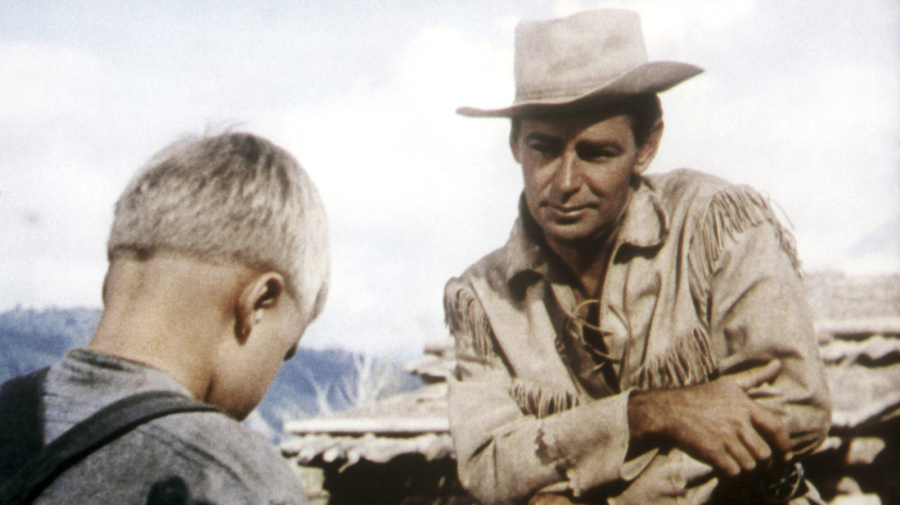
In George Stevens' Shane, Alan Ladd plays the title character, a gunfighter who appears out of nowhere in the midst of an ongoing dispute between a wealthy cattle baron named Ryker and the homesteaders who have legally claimed pieces of land Ryker considers to be his. What makes Shane so great, though, is all the stuff going on beneath the surface.
This movie is sort of famous for its unspoken sexual tension — the famous scene of Alan Ladd's Shane and Van Heflin's Joe sweatily demolishing a giant tree stump comes to mind. It's a movie about desire — everyone seems to obsessively desire Shane in some way, whether it's to love him, to kill him, or, like little Joey (a scene-stealing Brandon deWilde), to just be in his presence as much as possible.
Shane himself seems to be impossibly controlled, cautious, and good, which makes everyone around him crackle with a kind of nervous energy. Nevertheless, Shane knows there is a darkness within him that he can't escape. The complicated, unspoken, inevitable mystery of that darkness is what makes this movie so special.
Johnny Guitar (1954)
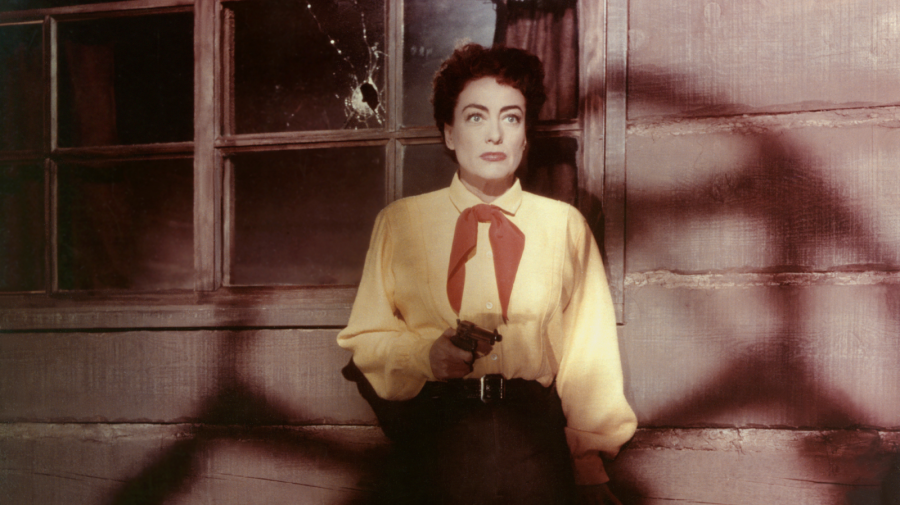
At the center of Nicholas Ray's Johnny Guitar is an all-time great movie star performance by Joan Crawford as Vienna, a strong, entrepreneurial owner of a saloon on the burgeoning railroad, which — in classic Western fashion — is opposed by the local cattlemen. Vienna sees the future coming, and she wants to be in position to capitalize on it; she knows that it's a cruel world, especially for a woman, and she wants to be able to have the resources to take care of herself.
Vienna's confidence and independence draws the ire of Emma Small, played with explosive jealousy and rage by Mercedes McCambridge in, for my money, one of the greatest villain performances ever. The conflict between these two women drives the story, and that's only one of the revisionist subversions going on in Johnny Guitar. Somewhat ignored in its time, it's since been praised by some of the greatest filmmakers from around the world — Martin Scorsese, François Truffaut and Shinji Aoyama, just to name a few — for its boldness and for the way it warps the Western genre.
The Man Who Shot Liberty Valance (1962)
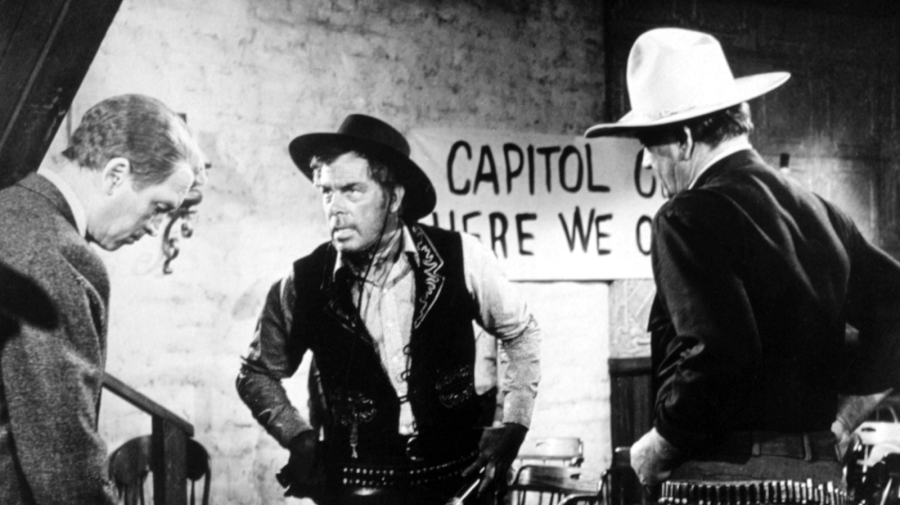
This film was directed by John Ford, the legendary filmmaker whose career embodies the progression from traditional Westerns, like 1939's Stagecoach, to revisionist Westerns, like this one. The Man Who Shot Liberty Valance is about an aging U.S. Senator looking back on one of the most significant moments of his life — his supposed shooting of an outlaw by the name of Liberty Valance.
The story — told mostly in flashback — is structured around an ongoing argument between Jimmy Stewart's Ransom Stoddard, who believes in non-violence and the prominence of the law, and John Wayne's Tom Doniphon, a classic Western cliche of a man who believes that, in the end, evil can only be stopped by force. Which side ultimately wins the argument and how history remembers the events of the past are questions that will stick with you long after you've seen this movie.
The Wild Bunch (1969)
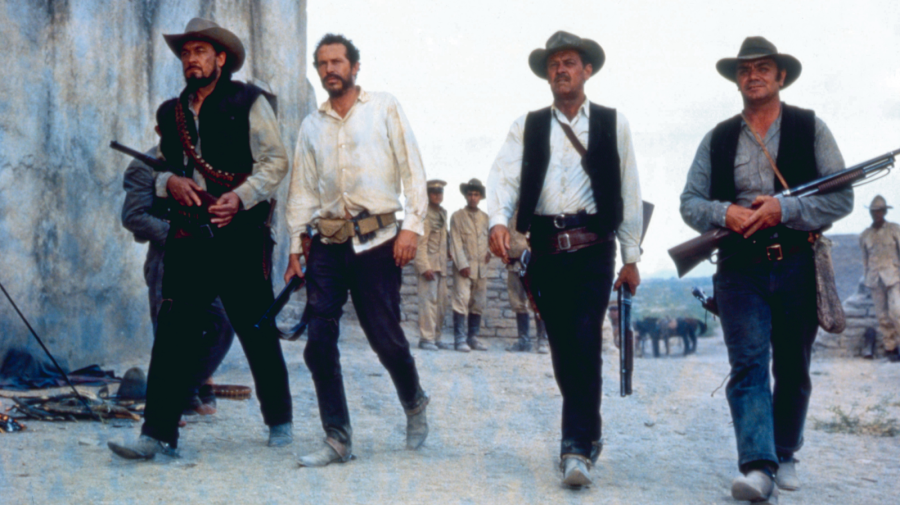
One way to revise a genre is to exaggerate it and blow it out of proportion. Westerns, of course, often revolve around violence, but that violence can end up being glorified — the glory of the fastest gun, for example. The Wild Bunch, Sam Peckinpah's film about a group of aging outlaws going after one last score, is packed so full of violence — smashed together in rapid cuts and parallel edits — that it leaves you utterly overwhelmed. Instead of glorifying the violence, it makes the violence feel real, devastating and terrifying.
Peckinpah pays lots of attention to the everyday people whose lives are shattered by the violence around them. These people, off to the side of the main action at all times, create a feeling of ambivalence about the actions of the so-called heroes. In the best way possible, The Wild Bunch is a Western I love that can also make me question why I love Westerns.
Near Dark (1987)
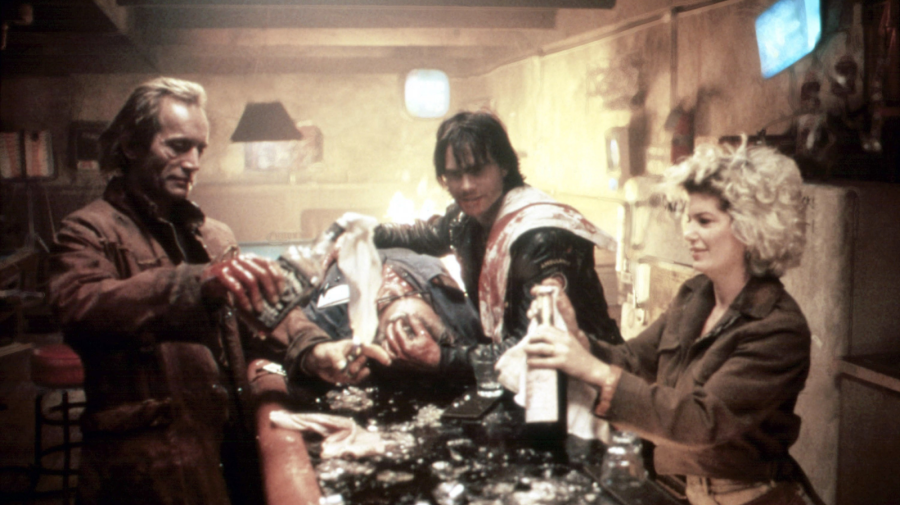
I wanted to make sure to include at least one film here that revises the ideas of the Western by adding elements from outside the genre, and Near Dark is a great example. Director Kathryn Bigelow (who later won a Best Director Oscar for The Hurt Locker in 2008) made this genre mash-up of Westerns and Horror Movies. It's also a kind of love story between a young man named Caleb and a girl named Mae — who also happens to be a vampire.
Near Dark amplifies some of the questions about violence and The West that directors like Peckinpah were dealing with, but does so by adding supernatural elements to the equation. The result is totally unsettling, and the characters really stick with you. Like most people in Westerns, they're trapped in the context of the setting of their lives, and this movie treats them with a tenderness that will surprise you given all the horror and gore happening throughout.
Meek's Cutoff (2010)
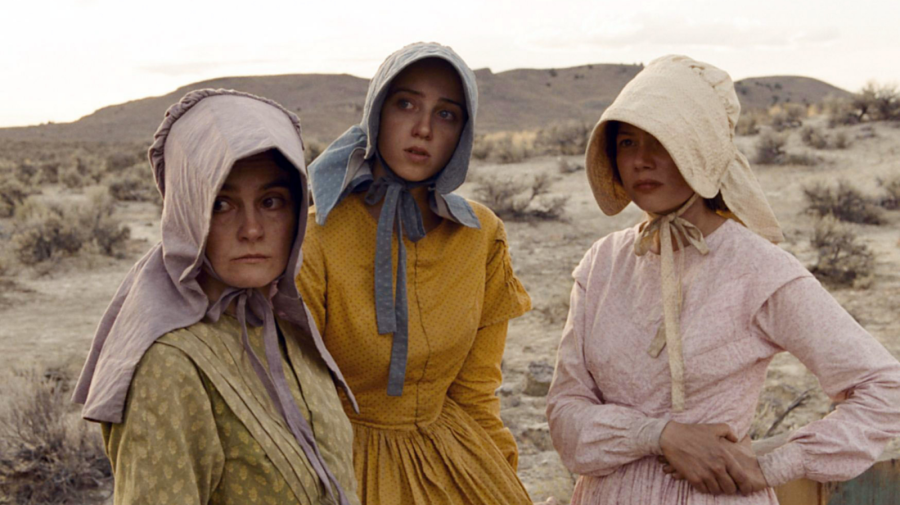
I'm an enormous fan of the films of Kelly Reichart, who also directed 2019's First Cow, a movie that veers into revisionist Western territory as well. Meek's Cutoff is an intense, quiet movie about a group of settlers heading west across the Oregon desert in 1845. The settlers are being guided by Stephen Meek, played by Bruce Greenwood, but they start to suspect he's lost. As the voyage stretches out, they begin running out of food and water.
Most interestingly, the movie critiques the gender norms of the day in a way that can't help but leave you thinking about how far we still have to go. The men in the group are in charge, and the wives are forced to look on while the men debate about how long to go on following Meek. In a way, it all feels like an elaborate joke, and you might start to really feel the overwhelming stupidity of the situation. I won't spoil what happens, but the ending turns the situation on its head, leaving us wondering where we go from here.
True Grit (2010)
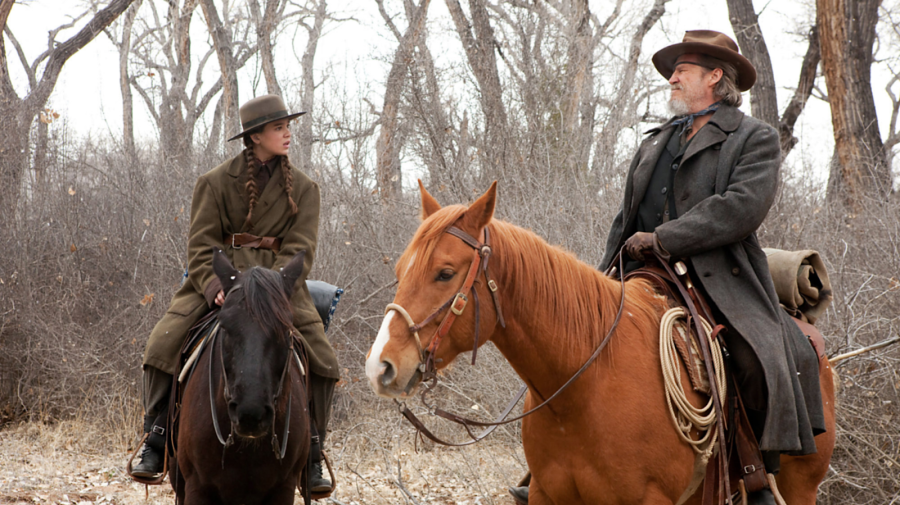
This adaptation of the novel by Charles Portis (it was also made into a film in 1969 starring John Wayne and marked his only Oscar win) is the story of a young girl who sets out to bring the man who killed her father to justice. Hailee Steinfeld was nominated for an Oscar for her incredible performance as the young girl, Mattie Ross, who hires an aging lawman named Rooster Cogburn (Jeff Bridges) to help her.
In both the novel and this adaptation, Mattie's perspective is at the center of every moment, and that's what makes the film so special. Filmmakers Joel and Ethan Coen show us the world through Mattie's eyes, so what is in many ways a common Western story — a good person who was wronged sets out for justice — is given a surprising frame of reference.
Really, it's a story about a kid who finds that the adults around her don't really know how to make the world work the way it should. Steinfeld's Mattie is one of the most salient heroes on this list, and the film's ending, with Mattie looking back on the greatest adventure of her life, is one of the most moving I can remember.
The Harder They Fall (2021)
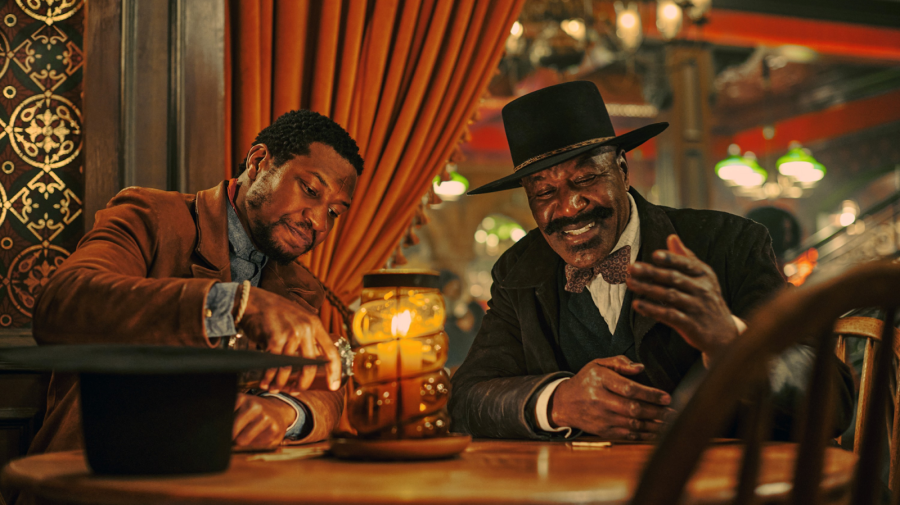
I'll end this list with this recent film by Jeymes Samuel, a classic Western revenge story about a man who learns that the man who killed his parents is about to be released from prison. Every member of the principal cast of the film is Black, and that context is part of the point of the film. All of these characters — good and bad — are trying to carve out a place for themselves in the West. In one of the most salient images of the movie, when the main characters rob a "white town" later in the film, everything in the town is literally bright white.
Under his stage name, The Bullitts, Samuel did the entire score for the film, and the music does the same thing the visual style of the film does: mashes up genres and eras to create a new commentary on the Western. Elements of hip-hop, R&B, and reggae serve to make the film feel authentic within itself. It looks and feels like the Old West, but it also looks and feels brand new. There's something exhilarating at seeing the incredible cast of this movie — again, all Black — in the midst of a genre that historically excluded Black people. Hollywood has been making Westerns for over 100 years now, and it's nice to know that they can still feel like something I've never seen before.
Source: https://www.ask.com/tvmovies/revisionist-westerns-if-you-loved-power-of-the-dog?utm_content=params%3Ao%3D740004%26ad%3DdirN%26qo%3DserpIndex
0 Response to "I Love You Dog Funny Images"
Post a Comment